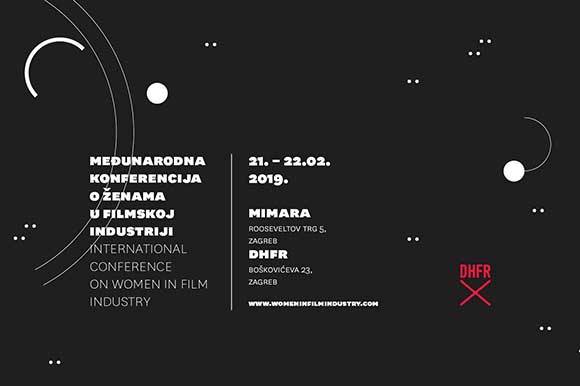Under the common denominator of women in film, the conference will welcome, among others, Pauline Durand Vialle, Chief Executive of FERA and Kristina Börjeson, Swedish representative in Eurimages, producer Bianca Oana, journalist Véronique Le Bris, and famous actresses Mirjana Karanović and Neda Arnerić
Zagreb, February 15, 2019 – The International Conference on Women in Film Industry will be held on February 21 and 22 at the Mimara Museum and the Croatian Film Directors' Guild. Organized by the Guild, this conference will bring together many prominent women who are working in the audiovisual industry in Croatia and abroad, with the aim to stimulate a discussion about the role and position of women in film industry.
With a number of round tables, panel discussions, lectures and projections, the conference will cover many topics, such as the visibility of female filmmakers, their presence, their equality with their male counterparts, copyright issues, peculiarities in their work, and many other themes regarding women in film industry.
In addition to an interesting round table entitled Film is masculine, film industry feminine? and the panel discussion Authors’ Rights – Women’s Rights, the conference attendants will have a chance to see two interesting film projections. With the screening of The Ninth Circle (1960) we will remember screenwriter Zora Dirnbach, the first woman who won a Golden Arena at Pula Film Festival, and the screening of the short documentary Women Pioneers in European Cinema will be followed by a presentation and discussion about the women’s (in)visibility in the history of film with the French journalist Véronique Le Bris.
A number of prominent female guests will share their experiences in the industry traditionally dominated by men: Cécile Despringe, the Executive Director of the Society of Audiovisual Authors (SAA / France, Belgium), Pauline Durand Vialle, the Chief Executive of the Federation of European Directors (FERA / Belgium), Romana Matanovac Vučković, an associate professor at the Chair of Civil Law at the Faculty of Law in Zagreb, Edith Sepp, the CEO of the Estonian Film Institute and vice-president of the EFADs, Kristina Börjeson, the Swedish representative in Eurimages, Martina Petrović, the Head of MEDIA Desk Croatia, Francine Raveney (France), a member of the Secretariat of Eurimages in charge of the gender equality issues, Carmen Guarini (Argentina), director and producer of documentary films, actress and director Mirjana Karanović (Serbia), Bianca Oana (Romania), producer of Touch Me Not, which won the Golden Bear at Berlinale 2018, directors Agnes Kocsis (Hungary), Marija Perović (Montenegro), Teona Strugar Mitevska (Macedonia), whose film God Exists, Her Name Is Petrunya, made in co-production with Croatia, is currently in competition for the Golden Bear award, Snježana Tribuson (Croatia), Vlatka Vorkapić (Croatia) and Lidija Zelović (the Netherlands), producers Tamara Babun (Croatia), Amra Bakšić Čamo (Bosnia and Herzegovina), Ankica Jurić Tilić (Croatia), Sonja Prosenc (Slovenia), Marta Zaccaron (Italy), and actresses Neda Arnerić (Serbia), Lana Barić (Croatia), Vanesa Glodjo (Bosnia and Herzegovina), Hélène Kuhn (France), and Ksenija Marinković (Croatia).
In anticipation of the Conference, some interesting facts on the percentage of women directors whose films were selected and awarded at some of the biggest world film festivals has been published on the official website. For instance, since 1946, only 5% of the films selected for the competition at the International Film Festival in Cannes were directed by women. Pula Film Festival statistics are even worse – since 1954, its competition included only 2,7% films directed by women. When it comes to awards, the percentage of women winners of the Cannes Grand Prix is only 4%. From the foundation of that festival, it has been awarded to Marta Meszaros for Diary for My Children (1984), Naomi Kawase for Morning Forest (2007) and Alice Rohrwacher for The Wonders (2014.). In the history of Cannes, only one woman has won the Palme d’Or: Jane Campion for Piano (1993). The only Golden Arena for Best Director given to a woman was the one Hana Jušić received for Stop Staring at My Plate (2017). The Golden Arena for Best Film (the Grand Prix of Pula Film Festival) has never been won by a woman.
The conference is open to public, with the obligatory previous registration until February 19 because of the limited number of seats. The official languages are Croatian and English, with simultaneous translation provided. The Conference is held under the auspices of the Ministry of Culture of the Republic of Croatia
For more details please visit the official website http://womeninfilmindustry.com/.




















